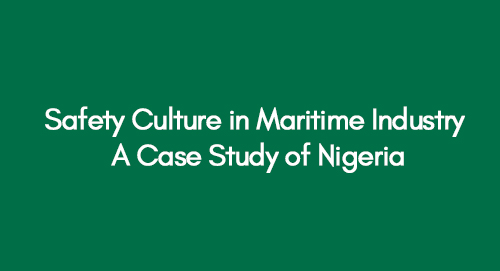
Significant Learning Experience in Healthcare
June 3, 2022
Exploring Medication Errors in Kuwait Government Hospitals: Identifying Challenges and Proposing Solutions
June 4, 2022Research proposal
Introduction
In the maritime industry around the globe, safety culture has become one of the main priorities, whereas, the knowledge and attitudes of the workers are directly responsible for its effectiveness. This is because, when essential safety culture is practiced in the maritime industry, the performance of the industry increases. Furthermore, the effective practice of a safety culture in the maritime industry provides an intense level of competitive advantage to the chosen industry. Although safety culture is a part of advancement for several developed countries, Nigeria's maritime industry will be targeted for this research to perform an extensive evaluation from the perspective of an underdeveloped country.
In the maritime industry of Nigeria, the main focus of management is to develop, and maintain a level of safety culture that provides effective protection and support to the environment and the workers of the industry at a similar time (Altinpinar, and Basar, 2018). However, this effective level of safety measure implication can only be performed when the workers of the Nigerian Maritime industry have enough level of knowledge about the issues that are being experienced in the past and present so that they can be aware of such safety issues in the future. The current research proposal is been developed for determining and analyzing the level of knowledge and attitude of workers towards the safety culture that had been practiced in the maritime industry of Nigeria. While identifying the safety culture in the maritime industry of Nigeria, the current researcher has come across the problem
Problem statement
An effective study performed by Seker, and Zavadskas (2017) to analyze the safety culture, highlighted that in the maritime industry, human errors commonly take place while recording the safety issues. These human errors are often made due to the lack of knowledge among the workers in the maritime industry. The lack of knowledge and ability to effectively address safety issues negatively affects the capability of the organizations in developing a productive safety culture for the vessels and their workers. This makes the maritime companies powerless in delivering effective safety culture to their workers (Seker, and Zavadskas, 2017).
Research aim and objectives
Research aim
The basic aim of this research proposal is to analyze the knowledge level and attitude of the workers in maritime industries in Nigeria towards effectively imposing a safety culture within the organization. The analysis results could be used to devise a counter-strategy that could fill in the gap of possible human errors that take place in recording the safety culture of the maritime industry effectively.
Research objectives
With the above-developed research aim, the following research objectives were identified.
Objective#1: To critically analyze the practices of the maritime industry in delivering effective safety to workers from work-related hazards.
Objective#2: To critically identify the knowledge level of workers for safety issues while performing their assigned tasks in the maritime industry.
Objective#3: To critically analyze the hazard reporting practices of companies working with the maritime industry of Nigeria.
Objective#4: To critically discuss the safety culture in the maritime industry of Nigeria.
Objective#5: To critically indicate the processes followed in the safety culture of the maritime industry of Nigeria.
Research questions
Question#1: What safety practices are used in the Maritime industry of Nigeria?
Question#2: What level of knowledge is practiced by the workers of the Maritime Industry while experiencing different safety issues?
Question#3: What type of hazard reporting practices are been followed in the Maritime industry in Nigeria?
Question#4: What type of safety culture is supported in the Nigerian maritime industry?
Review the following:
Literature review
According to the study by Ogbonna, and Harris (2015), culture can be described as the complex framework used for expressing the professional and national attitudes of the individuals who are working or living in the society. Concerning the term culture beelined above, corporate culture can be described as the behavioural code of conduct that is used and necessary for attaining the committed goals of the organization. The corporate culture is been developed by the corporate heads of the organization for increasing the overall commitment of the organizational workers to attaining the organizational goals (Nazarian, Atkinson, and Foroudi, 2017).
In addition to this, the study by Komu, and Kibe, (2019) have also highlighted that culture plays an important part in the development of society and industry as well. Therefore, the organizational culture can be explained as the collection of activity performance patterns that are followed by the organizational employees belonging to various ethnic groups. Concerning the organizational culture, the safety culture that exists in the maritime industry can be explained as the processes that are performed by the management of the industry for delivering effective safety to the workers so that they can perform their assigned tasks rather efficiently (Dyson, 2019). Considering the fact that the majority of the workers belong to different ethnicities, the safety culture is also developed by the shared values of every ethnicity in a manner that does not contradict the main organization's culture (Hiekkataipale, and Lämsä, 2019).
Moreover, Abeysiriwardhane, et al., (2016) explained the impact of knowledge in developing the attitude toward resolving the safety issues experienced by Maritime workers. The level of knowledge acquired by the workers through effective training can support them in reducing the level of safety issues. Further, it had been identified by Håvold, and Oltedal, (2018) that knowledge regarding safety issues and imposing a safety culture in the workplace can support an increment in the performance of the workers. This is because, with fewer safety issues, the workers rather feel free in performing their assigned tasks. This freedom of performing the activities by the workers in the maritime industry can also support their overall growth and accomplishment of workers and the industry as a whole. Several other researches such as have also agreed that knowledge about imposing an effective safety culture in the industry helps the workers in performing their assigned tasks effectively and efficiently (Relling, et al., 2018).
Methodology
The methodology is the most important yet critical part of the research which helps in identifying the research objectives. Research methodology is associated with data collection, and analysis to evaluate acknowledgeable answers to the research questions. This also helps in defining the research approach for collecting and analyzing the data and for producing and explaining the results (Quinlan, et al., 2019).
Research Philosophy
Alston and Bowles, (2018) identified three main types of research philosophies that are used in social sciences research including interpretivism; positivism, and realism. Considering how maritime industries in Nigeria will be targeted for this research, it is evident that statistical and objective data will be certainly collected. Based on this perspective, this research will be conducted with positivism as a research philosophy while making the research more valid and reliable. This type of research philosophy will help the current researchers in acquiring the factual knowledge deduced from reality-based events (Hughes, and Sharrock, 2016).
Research approach
Research approaches are the practices used by researchers for learning more about their chosen research topic in a specified manner. Three main research approaches are generally been used in different types of research including qualitative, quantitive and mixed research approaches (Bullock, Little, and Millham, 2017). All these approaches are explained in detail in the third chapter of the current thesis. But, for the sake of the current research proposal, it is stated that the current research will be using mixed methods for collecting and analyzing the data.
Data collection and analysis
Data collection
For the current research proposal, which contains the basic topic "workers’ knowledge and attitude towards the safety culture in the maritime industry in Nigeria", the primary data collection technique will be used for data collection. To collect primary data, surveys will be conducted with the vessel employees, while managers could be investigated through interviews in the maritime industry. Around 15 maritime industry managers will be selected as a sample size for this research, and the survey will be conducted with 200 vessel employees. The attitude of workers will be measured using an attitudinal scale that will be developed using the Likert method of summative scaling based on “strongly agree, agree, neutral, disagree, and strongly disagree”. Moreover, the level of knowledge among workers regarding safety issues will be measured through a mix of direct and indirect methods of knowledge measurement. That is, the use of the direct approach of developing association and indirect knowledge measuring approach by using performance reports and work experiences of the workers will be used for measuring the knowledge.
Review the Following:
Research Limitations
Considering the methodology of this research, it can be identified that the main limitation of the current research is that not all the industries in Nigeria could be targeted for this research whereas not all the underdeveloped countries are being targeted. This means that the study is limited to a specific country and industry. The study had other limitations that are based on the scope of conducting research. That is the current studies do not provide broad data that could help in broadening the scope of their research.
Research timeline



References
Abeysiriwardhane, A., Lützhöft, M., Petersen, E.S. and Enshaei, H., 2016. Human-centred design knowledge into maritime engineering education; theoretical framework. Australasian Journal of Engineering Education, 21(2), pp.49-60.
Alston, M. and Bowles, W., 2018. Research for social workers: An introduction to methods. Aotearoa New Zealand Social Work, 30(3), pp.96-97.
Altinpinar, I. and Basar, E., 2018. Comparison of the safety cultures of Turkish aviation and maritime transportation workers. International journal of occupational safety and ergonomics, pp.1-10.
Bullock, R., Little, M. and Millham, S., 2017. The relationships between quantitative and qualitative approaches in social policy research. In Mixing methods: qualitative and quantitative research (pp. 81-99). Routledge.
Dyson, T., 2019. The military as a learning organisation: establishing the fundamentals of best-practice in lessons-learned. Defence Studies, 19(2), pp.107-129.
Håvold, J.I. and Oltedal, H.A., 2018. Culture and maritime safety. In Managing Maritime Safety (pp. 53-70). Routledge.
Hiekkataipale, M.M. and Lämsä, A.M., 2019. (A) Moral Agents in Organisations? The Significance of Ethical Organisation Culture for Middle Managers’ Exercise of Moral Agency in Ethical Problems. Journal of Business Ethics, 155(1), pp.147-161.
Hughes, J.A. and Sharrock, W.W., 2016. The philosophy of social research. Routledge.
Komu, M.D. and Kibe, J., 2019. EFFECTS OF ORGANIZATION CULTURE, ORGANISATION PERFORMANCE IN MANAGEMENT DECISION MAKING: A CASE STUDY OF AIRLINE ‘A’IN KENYA. EFFECTS OF ORGANIZATION CULTURE, ORGANISATION PERFORMANCE IN MANAGEMENT DECISION MAKING: A CASE STUDY OF AIRLINE ‘A’IN KENYA, 33(2), pp.10-10.
Nazarian, A., Atkinson, P. and Foroudi, P., 2017. Influence of national culture and balanced organizational culture on the hotel industry’s performance. International Journal of Hospitality Management, 63, pp.22-32.
Ogbonna, E. and Harris, L.C., 2015. Subcultural tensions in managing organisational culture: a study of an English Premier League football organisation. Human Resource Management Journal, 25(2), pp.217-232.
Quinlan, C., Babin, B., Carr, J. and Griffin, M., 2019. Business research methods. South-Western Cengage.
Relling, T., Lützhöft, M., Ostnes, R. and Hildre, H.P., 2018, July. A human perspective on maritime autonomy. In International Conference on Augmented Cognition (pp. 350-362). Springer, Cham.
Seker, S. and Zavadskas, E., 2017. Application of fuzzy DEMATEL method for analysing occupational risks on construction sites. Sustainability, 9(11), p.2083.
Get 3+ Free Dissertation Topics within 24 hours?


















 Download PDF File
Download PDF File







